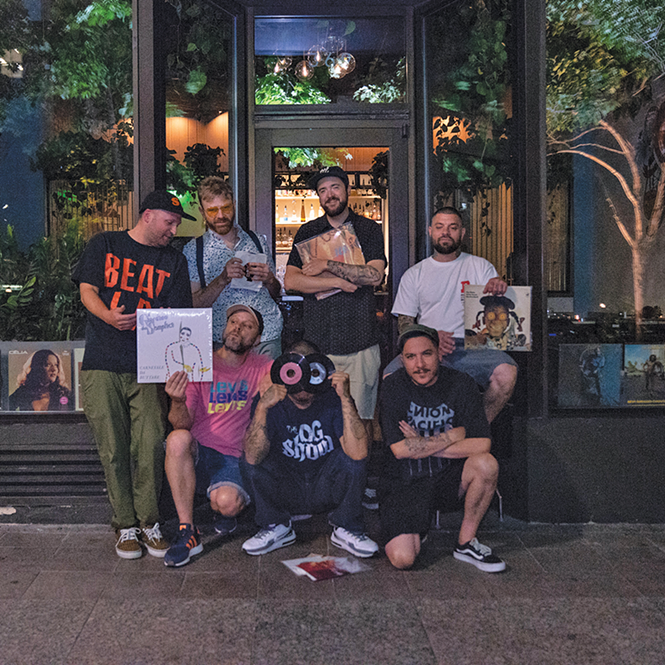A DJ's Present Is a Record's Past
The Caviar Club collective cover the history of plying the DJ's craft.
By Erin Moore @errrands_DJs exist in a world in between: between daylight and deep night; between the beginning and end of a song; between the liner notes in an album jacket. Local DJs who are part of the Caviar Club find another one of these spaces on Monday nights at Alibi Bar & Place (369 S. Main, 385-259-0616). After playing music into the night at SLC bars and clubs, churning out hits for 9-to-5ers and youngsters, these friends gather at the small, grotto-ish bar and play their stuff.
James Ramirez, aka DJ Sneeky Long, says simply, "We wanted a night where we could come and play the type of stuff that we listen to specifically on vinyl." That stuff? Ramirez lists off soul, funk, jazz, hip-hop, reggae, Latin music, World music, Brazilian music, salsa, samba, psychedelic rock, prog rock and "old" electronic music. "Anything with a groove, we'll play it. It's a night for us to all nerd out, with a cool sound system, where we can drink beers and get paid for it." The fact that it's a Monday night that doesn't yield much cash doesn't make a difference. "It's a passion project," he stresses.
The owners—formerly bartenders at Bar X, where DJ J Godina spearheaded the Caviar Club nights—pulled the Club along with them to their new bar. "We were their playlist every night while we were working. And they loved it, so it just kind of transferred," Ramirez explains.
Funk bumps inside the bar and more DJs roll up—Fisch Loops, SamEyeAm, Chaseone2 and FellSwoop, all probably familiar to anyone who's even glanced at a poster-encrusted wall in SLC (some of them are even past City Weekly DJs of the Year). But no one is as familiar with these dudes as they are with one another; many of them met in the late '90s as teenagers in the SLC hip-hop and DJ scenes, which is to say, they go way back.
That history has brought them all to different places at different times, but they've all ended up DJing. DJ Fuego Skilz (Mike Ramirez) has a background in rap, and along with DJs Fell Swoop (Josh Edwards) and Chaseone2 (Chase Loter), has been, by virtue of sheer music enthusiasm, "fast-tracked" into the DJ world by more experienced friends like DJ Finale Grande (Adam Terry).
Mike Ramirez adds, "Some of us are actual music producers. Finale Grand is huge music producer. He's done work for well-known artists. Same thing as SamEyeAm, and I'm into that now as well."
While they share musical tastes, their careers are diverse. "That's kind of how this whole crew came to be—basically for the love of hip-hop, and samples and records," Loter explains. He, and almost every other DJ, mentions the fun of going down the "rabbit hole" of genres, especially those found within hip-hop. Terry explains it best: "People think of hip-hop ... as such an isolated genre, but it's really just the accumulation of every genre."
Terry began exploring hip-hop with James Ramirez, straight out of high school in the late '90s. They began DJing for fun at parties, and this interest turned into gigs, and gigs created a need for more music. "Then it got into record-digging, looking for obscure music, looking for samples for hip-hop beats that we liked. Then it just spiraled into learning about every genre," Terry explains. But, as young DJs, the more they learned, the more they learned to keep to themselves. When DJing began in the '70s, the rarer the material a DJ had, the more attractive he was to a club and to audiences.
"So you'd go to lengths, like leaving the record jacket at home, or putting it in another record to fuck with people, or covering the labels with fake labels or washing them off," Terry explains of the customs still prevalent in his early years. While time and technology have made the practice of obscuring music impossible, Terry still sometimes feels like keeping things to himself. "It still hits you in that place, like 'Don't you wanna know?' But then, it's music, and it's for everybody, and that's the point of it."
This new openness, plus the very tradition of crate-digging being gutted by the vinyl resale boom, has forced some to rethink their relationships to and understandings of music. Terry describes a new widespread interest in the extremely rare and delicate tape format, which blew up in 1980 due to its accessible home-recording capabilities. As a result, troves of limited-run, indie-released tapes exist all over the world, waiting to be found.
Fisch Loops (Daniel Fischer) and Terry are busy releasing their own tape on Terry's FOUNTAINavm label—a vaporwave tape that references the 2014 iteration—and planning a release show and tape-listening party, where each tape changeout will allow listeners to "clean their ears," as Terry says.
"You pull it out and everybody looks at it and pays attention. It's bringing music to the forefront, and that's my mission I think." The fact that Terry—a DJ whose task it is to create seamlessness between songs—finds value in a tape change's negative space seems to indicate a future where constant passion for music and changes in tradition can coexist, as the present and memory always do.
More by Erin Moore
-
The Granary, The Florist and the theme park-ification of Salt Lake City
Opinion
- Mar 13, 2024
-
Salt Lake City's dense, walkable spots are great for business—if businesses can find one
Small Lake City
- Feb 14, 2024
-
Dating counselors help singles move past relationship hiccups and get to the next date.
Looking for Love
- Feb 7, 2024
- More »
Latest in Music
Readers also liked…
-
The Alpines Head North
Local band's debut concept album finds musical bliss in the apocalypse.
- Feb 7, 2024




